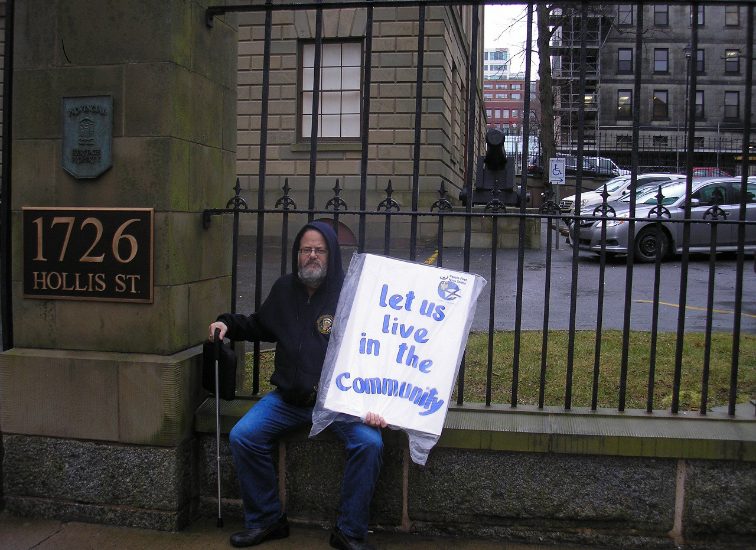
KJIPUKTUK (Halifax) – In a decision released earlier this week Human Rights Board of Enquiry Chair Walter Thompson ordered the Department of Community Services to provide space in small option homes for Beth MacLean and Joey Delaney.
Beth and Joey are two of the three complainants who spent many years locked up in Emerald Hall, for no reason other than that Community Services needed to accommodate them somewhere. Sheila Livingstone, the third complainant, unfortunately died before the tribunal reached its conclusion.
There was no medical need for any of them to be in Emerald Hall, Thompson determined, and the province discriminated against them by failing to provide suitable living conditions.
By all accounts Emerald Hall, an annex to the Nova Scotia Hospital, is a terrible place. Doors are locked, you can’t leave unless accompanied by staff or family, staff come and go, and everything from bathing to eating a meal is scheduled. Some of the residents are psychotic and it’s noisy, there is little or no privacy.
It sounds a lot like a jail, if you think about it.
Emerald Hall may have been the worst place the complainants spent time, but they were institutionalized in other places as well.
Compensation not as good as it sounds

Thompson ordered the province to pay compensation to the three complainants. Beth MacLean and Joey Delaney are to receive $100,000 each, and two of Beth MacLean’s relatives are to receive $10,000 each.
That may sound generous (and it’s double what the Province proposed), but it is peanuts when you take into account the decades the three were institutionalized, away from community and their loved ones, and subjected to a regime that allows almost no space for making your own decisions.
The justification for the small amounts in compensation ordered by Thompson left me scratching my head
“Joey Delaney is so disabled that payment to him of a very large sum will not have a greater impact on his life than a moderate sum,” wrote Thompson.
To me that sounds as if Thompson believes that the more disabled you are, the less of an award you warrant.
“Beth MacLean does have capacity, but the potential benefit to her of a very large damage award is limited,” Thompson wrote as he continues to pursue that puzzling line of thought.
But there should be money for “Ms MacLean, for example, to provide pizza for everyone on an evening, or an added streaming service for the television,” Thompson wrote.
I can’t imagine anybody ever making such a patronizing argument when deciding on compensation for a person without disabilities.
See also: Op-ed: Is the chair of the NS human rights board ‘un-woke’ or just unaware?
When determining the amounts, Thompson also considered that civil servants were well-intentioned, that political parties of all stripes contributed to the problem, that things in other provinces are also bad, and that the complainants were fed three square meals every day, and will continue to cost the province money until they die.
To me all this is puzzling.
Is it or isn’t it systemic?
The key to the small amounts awarded lies in a paragraph near the end of Thompson’s decision.
“It also seems to me that if I were to award the kinds of damages the Complainants seek, then I would be, in effect, positing a systemic remedy. I would be imposing a remedy that seeks to force systemic change by applying what may almost be said to be fines on the Province,” Thompson wrote.
In an earlier decision in the same case Thompson ruled that the province indeed discriminated against Beth MacLean, Sheila Livingstone and Joey Delaney. But Thompson then too rejected the suggestion that what Nova Scotia is doing to all those hundreds of people who continue to wait for suitable living accommodations, either while institutionalized or simply on a wait list, is in any way systemic.
See also: NS Human Rights Board ruling of discrimination in warehousing case disappointing
For instance, Thompson rejected the testimony by expert witness Dr. Catherine Frazee, who argued that the discrimination faced by people with disabilities is a manifestation of systemic ableism in our society.
During the enquiry it became clear that the province is doing very little to deal with a long waiting list of people waiting for small option homes. People on that list either live in large institutions at this time, or are taken care of at home by loved ones who are getting old.
For a long time there was even a moratorium in place on new small option homes.
That’s a systemic issue that Thompson did not want to consider.
This isn’t over by a long shot
That earlier decision by Walter Thompson is being appealed by the Disability Rights Coalition, consisting of organizations such a People First Nova Scotia, and the Nova Scotia Association for Community Living (NSACL).
In June of this year the Nova Scotia Court of Appeal allowed three national organizations that advocate on behalf of people with disabilities to join the appeal.
During the appeal the question whether discrimination suffered by the three complainants is systemic or not will be central once again.
With a special thanks to our generous donors who make publication of the Nova Scotia Advocate possible.
Subscribe to the Nova Scotia Advocate weekly digest and never miss an article again. It’s free!



